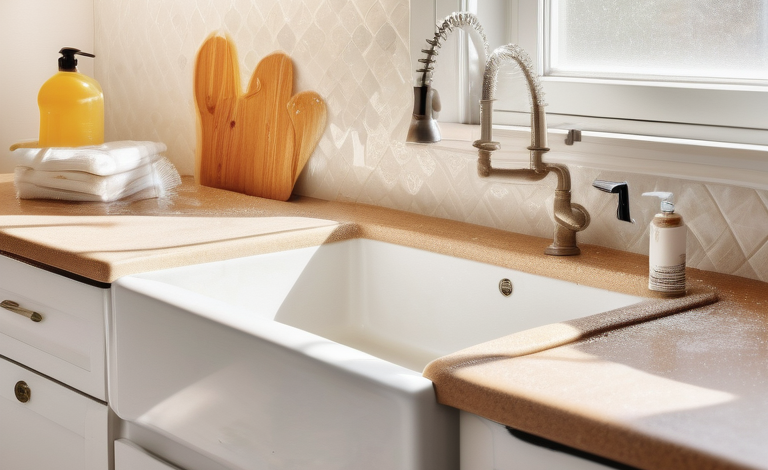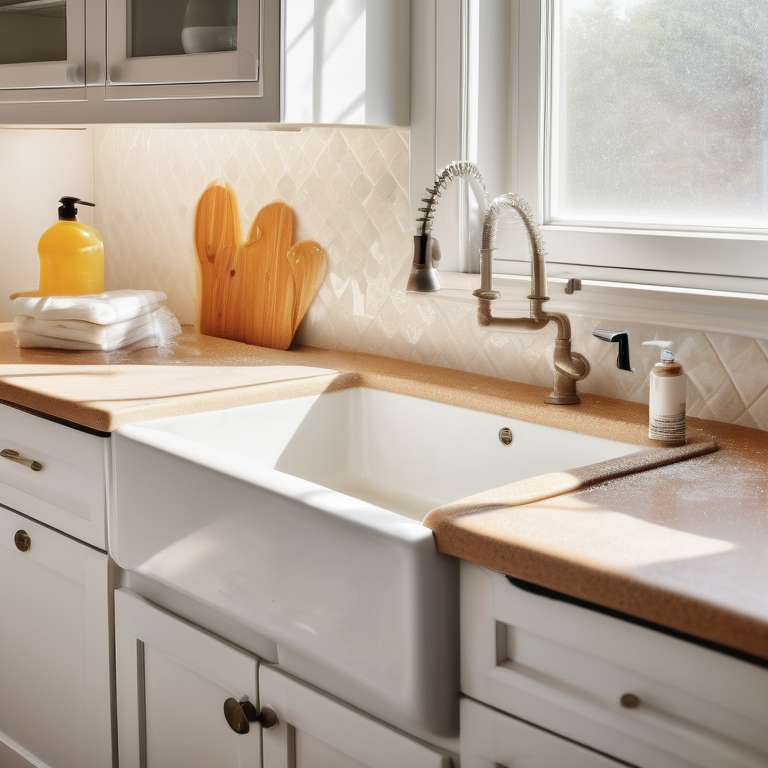Removing Hard Water Stains: Porcelain Sink Cleaning Guide


Key Highlights
- Hard water stains are a common problem in households, but they can be effectively removed from porcelain sinks.
- Verifying hard water stains and understanding their causes is crucial for effective cleaning.
- Essential supplies like a spray bottle, baking soda, white vinegar, and a hard water stain remover are necessary for removing hard water stains.
- Safe cleaning agents like hydrogen peroxide and lemon can be used to clean porcelain sinks.
- Tools like a toilet brush, paper towel, microfiber cloth, and a soft brush are essential for effective cleaning.
- A step-by-step guide to removing hard water stains can help homeowners effectively clean their porcelain sinks.
- Natural remedies like vinegar and baking soda can be used to remove tough stains.
- Taking measures to prevent hard water stains can help keep porcelain sinks stain-free.
Introduction
Hard water stains can be a nuisance on porcelain sinks, but fret not – effective solutions are at hand. Understanding the nature of hard water stains and how to combat them is crucial for a spotless sink. Armed with the right tools and knowledge, you can bid farewell to those unsightly marks. Dive into this guide to discover the best cleaning agents, techniques, and natural remedies for restoring your porcelain sink’s pristine shine. Let’s turn your cleaning routine from chore to triumph with some good news.
Understanding Hard Water Stains on Porcelain Sinks
Hard water stains on porcelain sinks are caused by mineral deposits like calcium and magnesium. These stains appear as white spots or a cloudy film on the sink’s surface, resulting from hard water buildup over time. Soap scum and grime can compound the issue, leading to stubborn stains. Understanding the composition of these stains is crucial for effective removal using appropriate cleaning agents and techniques, including using a dishwasher for dishes to prevent hard water stains.
Identifying Hard Water Stains on Porcelain
Hard water stains on porcelain appear as chalky white deposits, often found around faucets or drains. These stains are caused by mineral deposits like lime, calcium, and magnesium, commonly present in hard water. They can be distinguished from soap scum by their more stubborn and crusty nature. If you notice these white deposits resisting regular cleaning methods, chances are you are dealing with hard water stains. Understanding the source of the stains is crucial for effective removal.
Essential Supplies for Removing Hard Water Stains
To effectively combat hard water stains on your porcelain sink, you’ll need some essential supplies. White vinegar and baking soda are key ingredients for DIY cleaning solutions. A spray bottle helps in evenly applying the mixture, while a soft brush or sponge aids in gentle scrubbing without damaging the sink surface. A dry microfiber cloth is perfect for polishing and removing any residue left behind. These basic supplies form the foundation for successfully removing hard water stains and keeping your porcelain sink looking pristine.
Safe Cleaning Agents for Porcelain
When it comes to cleaning porcelain sinks, using safe cleaning agents is essential to prevent damage. Opt for gentle solutions like a mixture of white vinegar and water or a paste of baking soda to effectively remove hard water stains without causing harm to the porcelain surface. These natural remedies are effective in breaking down mineral deposits and soap scum without the need for harsh chemicals. Ensure you use a soft brush or a microfiber cloth to gently scrub the stains away, preserving the integrity of your porcelain sink.
Tools You’ll Need for Effective STAINS Cleaning
To effectively clean hard water stains from your porcelain sink, gather essential tools for the task. Equip yourself with a soft brush, dry microfiber cloth, and a spray bottle for your cleaning solution. Additionally, have a pumice stone for tougher stains and a sponge for gentle scrubbing. Using these tools in combination with the appropriate cleaning agents will ensure a successful removal of hard water deposits without damaging your porcelain sink.
Step-by-Step Guide to Removing Hard Water Stains
Preparing Your porcelain sink for cleaning is the initial step. Create a mixture of white vinegar and water in a spray bottle for an effective cleaning solution. Apply the solution generously on the stained areas. Let it sit for a few minutes to penetrate the hard water buildup. Scrub the sink using a soft brush or sponge to remove the stains gently. Rinse the sink thoroughly with water and dry it using a dry microfiber cloth to reveal a sparkling, stain-free porcelain sink.
Preparing Your Porcelain Sink for Cleaning
Before starting the cleaning process, ensure your porcelain sink is free of debris. Rinse with water to remove loose dirt. Next, mix white vinegar and water in a spray bottle for an effective cleaning solution. Spray it generously over the sink surface, allowing it to sit for a few minutes to loosen hard water stains. Use a soft brush or sponge to gently scrub the sink, focusing on areas with visible stains. Rinse thoroughly with water before proceeding with the cleaning procedure.
Applying the Cleaning Solution
To effectively tackle hard water stains on your porcelain sink, start by applying a mixture of white vinegar and water. The acidity in the vinegar helps break down the mineral deposits causing the stains. Spray the solution generously over the stained areas, including the inside of the toilet bowl. Allow it to sit for a few minutes to penetrate the buildup. For tougher stains, create a paste using baking soda and water. This paste can be gently scrubbed onto the stains to lift them effectively.
Scrubbing Techniques for Stubborn Water Stains
When tackling stubborn water stains on your porcelain sink, effective scrubbing techniques are crucial. Using a soft brush or sponge, gently apply a paste of baking soda and water to the affected areas. Scrub in circular motions to target the stubborn stains effectively. For more challenging stains, consider using a pumice stone with caution to avoid scratching the porcelain surface. Remember to rinse the sink thoroughly after scrubbing to reveal a stain-free and sparkling finish.
Natural Remedies for Hard Water Stains
When dealing with hard water stains on your porcelain sink, natural remedies can be effective and eco-friendly. A mixture of white vinegar and water can work wonders in breaking down the mineral deposits. For tougher stains, creating a paste using baking soda and water can provide an extra scrubbing boost, making it the best hard water stain remover. These DIY solutions are gentle on your porcelain surface while effectively tackling hard water buildup. Incorporate these natural remedies into your cleaning routine for a sparkling and stain-free porcelain sink.
Vinegar and Water Solution
To tackle hard water stains on your porcelain, sink effectively, a vinegar and water solution is highly recommended. This natural remedy combines the acidic properties of white vinegar with the cleaning power of water to break down mineral deposits and grime. Simply mix equal parts of vinegar and water in a spray bottle, spray the solution generously onto the stained areas, including the bathtub, let it sit for a few minutes, then scrub gently with a sponge or soft brush. Finally, rinse with water and dry with a microfiber cloth for a gleaming porcelain sink. Looking for more bathtub cleaning tips? Check out our guide for how to clean a bathtub.
Baking Soda for Tough Stains
When tackling tough hard water stains on your porcelain sink, consider using baking soda. Form a paste with equal parts water and baking soda, then apply it directly to the stains. Let it sit for a while to break down the stubborn residue. The mild abrasiveness of baking soda helps in gently scrubbing away the tough stains without damaging the porcelain surface. This eco-friendly solution is effective in removing even the most stubborn hard water deposits, leaving your sink sparkling clean.
Measures to remove Your Sink Stain-Free
Regular cleaning routines are crucial to keep your porcelain sink stain-free. A simple daily wipe down with a dry microfiber cloth can prevent the buildup of hard water stains and mineral deposits. Implementing a weekly deep cleaning routine using gentle cleaning agents like white vinegar or baking soda can effectively remove any lingering stains. By incorporating these measures into your cleaning regimen, you can maintain a pristine porcelain sink free from unsightly water spots and stubborn stains. Additionally, using a specialized polish designed for porcelain sinks can help restore shine and protect against future stains.
Regular Cleaning Routines
Regular cleaning routines are essential for preventing the buildup of hard water stains on porcelain sinks. By incorporating these routines into your bathroom cleaning routine, you can keep your sink looking clean and stain-free.
One important step is to wipe down your sink regularly with a soft cloth or sponge after each use. This will help remove any water droplets or soap residue that can contribute to the formation of hard water stains.
In addition to regular wiping, it’s also recommended to deep clean your porcelain sink at least once a week. This can be done by creating a cleaning solution using a mixture of vinegar and water. Apply the solution to the sink’s surface and let it sit for a few minutes before scrubbing with a gentle scrubber or sponge and some dish soap. Rinse thoroughly with water and dry with a clean cloth.
By incorporating these regular cleaning routines into your bathroom cleaning routine, you can prevent the buildup of hard water stains and keep your porcelain sink looking clean and shiny.
Troubleshooting Common Issues in STAIN Removal
When it comes to removing hard water stains from a porcelain sink, there can be some common issues that arise. By troubleshooting these issues, you can ensure that the stain removal process is as effective as possible.
One common issue is using the wrong cleaning products. It’s important to use a cleaner that is specifically designed for removing hard water stains from porcelain surfaces. These cleaners are formulated to break down the minerals that cause the stains without damaging the porcelain.
Another common issue is not allowing enough time for the cleaning product to work. Hard water stains can be stubborn, and it may take some time for the cleaner to penetrate and dissolve the minerals. Be sure to follow the instructions on the cleaner and allow enough time for it to work before scrubbing or rinsing. Additionally, investing in a home water softener can prevent hard water stains from forming in the first place, saving you time and effort in the long run.
By troubleshooting these common issues, you can ensure that the stain removal process is effective and that your porcelain sink is free from hard water stains.
What to Do if Stains Persist
If you’ve tried various methods and products to remove hard water stains from your porcelain sink but the stains persist, there are a few options you can consider.
First, you can try using a stronger hard water stain remover. There are specific products available that are formulated to tackle stubborn stains. These products often contain stronger chemicals or abrasives that can help break down the minerals causing the stains. One option is to use a small amount of chlorine bleach, such as Bon Ami with bleach or Tilex, and let it sit for a few minutes before wiping it off. Be sure to follow the instructions on the product and take any necessary safety precautions.
If the stains still persist after using a stronger stain remover, it may be time to consider seeking professional help. Professional cleaners have specialized tools and products that can effectively remove even the toughest hard water stains. They can also provide advice on how to prevent future stains and maintain the cleanliness of your porcelain sink.
Overall, it’s important to be patient and persistent when dealing with stubborn hard water stains. With the right products and techniques, you can remove even the most stubborn stains and restore the beauty of your porcelain sink.
When to Seek Professional Help
While many hard water stains can be removed with DIY methods, there are instances where it may be best to seek professional help. If you have tried multiple methods and products to remove hard water stains from your porcelain sink but have not achieved satisfactory results, it may be time to call in the professionals.
Professional cleaners have specialized knowledge and equipment that can effectively remove even the most stubborn hard water stains. They can assess the severity of the stains and determine the best course of action for removal.
Additionally, professional cleaners can provide advice on how to prevent future stains and maintain the cleanliness of your porcelain sink. They may recommend specific cleaning products or routines that can help keep your sink looking clean and stain-free.
If you are unsure about how to properly clean your porcelain sink or if the stains are particularly stubborn, it is always a good idea to seek professional help. They can ensure that your sink is properly cleaned and restored to its original beauty.
Conclusion
In conclusion, maintaining a stain-free porcelain sink is achievable with the right approach and tools. By incorporating safe cleaning agents and effective scrubbing techniques, you can bid farewell to hard water stains. Additionally, natural remedies like vinegar and baking soda offer environmentally friendly alternatives. Consistent cleaning routines play a significant role in preventing future stains, ensuring your sink remains spotless. Should persistent stains pose a challenge, consider seeking professional assistance. Remember, a clean sink not only enhances the aesthetic appeal of your kitchen or bathroom but also reflects your commitment to cleanliness and hygiene.
Frequently Asked Questions
Can Lemon Juice Be Used as an Alternative to Vinegar?
Lemon juice can be used as an alternative to vinegar for removing hard water stains from a porcelain sink. It contains natural acids that can help break down the minerals causing the stains. However, lemon juice may not be as effective as vinegar and may require more scrubbing or multiple applications to achieve the desired results.
Are Chemical Cleaners Safe for Porcelain Sinks?
Most chemical cleaners are safe for porcelain sinks when used according to the manufacturer’s instructions. However, it’s important to avoid using harsh or abrasive cleaners that can damage the porcelain surface. Always read the label and follow the recommended usage and safety guidelines when using chemical cleaners on your porcelain sink.
How to get rid of hard water stains on porcelain sink?
To get rid of hard water stains on a porcelain sink, you can try using a mixture of vinegar and water. Apply the solution to the stained areas and let it sit for a few minutes before scrubbing with a soft brush or sponge. Rinse thoroughly with water and dry with a clean cloth.
How to remove watermarks from porcelain sinks?
Watermarks can be removed from porcelain sinks by using a mixture of vinegar and water. Apply the solution to the watermark and let it sit for a few minutes before scrubbing with a soft brush or sponge. Rinse thoroughly with water and dry with a clean cloth.
What are some effective methods for removing hard water stains from a porcelain sink?
Some effective methods for removing hard water stains from a porcelain sink include using a mixture of vinegar and water, baking soda paste, or commercial hard water stain removers. These methods can help break down the minerals causing the stains and restore the beauty of your sink.
Advice on cleaning the porcelain sink?
When cleaning a porcelain sink, it’s important to use gentle cleaning products and avoid harsh or abrasive cleaners that can damage the surface. Regular cleaning routines, such as wiping down the sink after each use and deep cleaning at least once a week, can help prevent the buildup of hard water stains.









